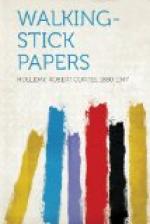In one of his later books George Moore chronicles his resolve to cultivate the habit of reading, to learn to read again. And he sucks much naive pleasure from the contemplation of this prospective enterprise; but he finds it very difficult to persevere in it, and drifts away instead into reveries of what he has read. There is a thought here, however, to be hearkened to: the idea of learning to read again.
What is it that happens to one in consequence of his ceasing to read? He suffers a hardening of the intellectual arteries. There are quaint old codgers one knows here and there who declare that in fiction there has “been nothing since Dickens.” They are delightful, of course; but one would rather see than be one. We all know many persons whose intellectual clock stopped some time ago, and there are people whose minds apparently froze at about the time when they should have begun to ripen, and which are like blocks of ice with a fish (or a volume of Huxley) inside. Nothing now can get in.
At those times of earnest introspection, when one would “swear off” this or that, would reduce one’s smoking, would adopt the principle of “do it now,” and so on—at those times an excellent New Year’s resolution, or birthday resolution, or first day of the month resolution, would be to re-learn to read, to keep, as Dr. Johnson said of his friendships, one’s reading continually “in good repair.”
EPILOGUE
ON WEARING A HAT
There is a good deal to be said about wearing a hat. And yet this humorous custom, this rich topic, of wearing a hat has been sadly neglected, as far as I can make out, by scholars, scientists, poets, composers, and other “smart” people.
Man has been variously defined, as the religious animal, and so on; but also, to the best of my knowledge and belief, he is the only animal that wears a hat. He has become so accustomed to the habit of wearing his hat that he does not feel that he is himself out of doors without it. Mr. Howells (I think it was) has told us in one of his novels of a young man who had determined upon suicide. With this intent he made a mad dash for the sea. But on his way there a sudden gust of wind blew off his hat; instinctively he turned to recover it, and this action broke the current of his ideas. With his hat he recovered




